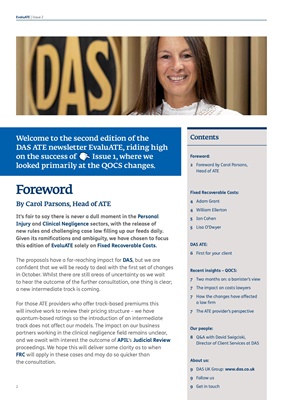
Foreword
By Carol Parsons, Head of ATE
It's fair to say there is never a dull moment in the Personal
Injury and Clinical Negligence sectors, with the release of
new rules and challenging case law filling up our feeds daily.
Given its ramifications and ambiguity, we have chosen to focus
this edition of EvaluATE solely on Fixed Recoverable Costs.
For those providers who offer track-based premiums this will involve
work to review their pricing structure - we have quantum-based
ratings so the introduction of an intermediate track does not
affect our models. The impact on our business partners working
in the clinical negligence field remains unclear, and we await
with interest the outcome of APILs Judicial Review proceedings.
We hope this will deliver some clarity as to when FRC will apply
in these cases and may do so quicker than the consultation.
The proposals for low-value clinical negligence cases create
further questions and, in my view, require a different approach
from ATE insurers to ensure that a client retains as much of
their damages as possible. The introduction of this protocol will
no doubt have another profound impact on the legal market,
where I am sure we will see some firms choose to stop handling
low-value clinical negligence cases.
Welcome to the second edition of the
DAS ATE newsletter EvaluATE, riding high
on the success of Issue 1, where we
looked primarily at the QOCS changes.
Contents
Foreword:
2 Foreword by Carol Parsons,
Head of ATE
Fixed Recoverable Costs:
4 Adam Grant
4 William Ellerton
5 Ian Cohen
5 Lisa O'Dwyer
DAS ATE:
6 First for your client
Recent insights - QOCS:
7 Two months on: a barrister's view
7 The impact on costs lawyers
7 How the changes have affected
a law firm
7 The ATE provider's perspective
Our people:
8 Q&A with David Swigciski,
Director of Client Services at DAS
About us:
9 DAS UK Group: www.das.co.uk
9 Follow us
9 Get in touch
2
EvaluATE | Issue 2